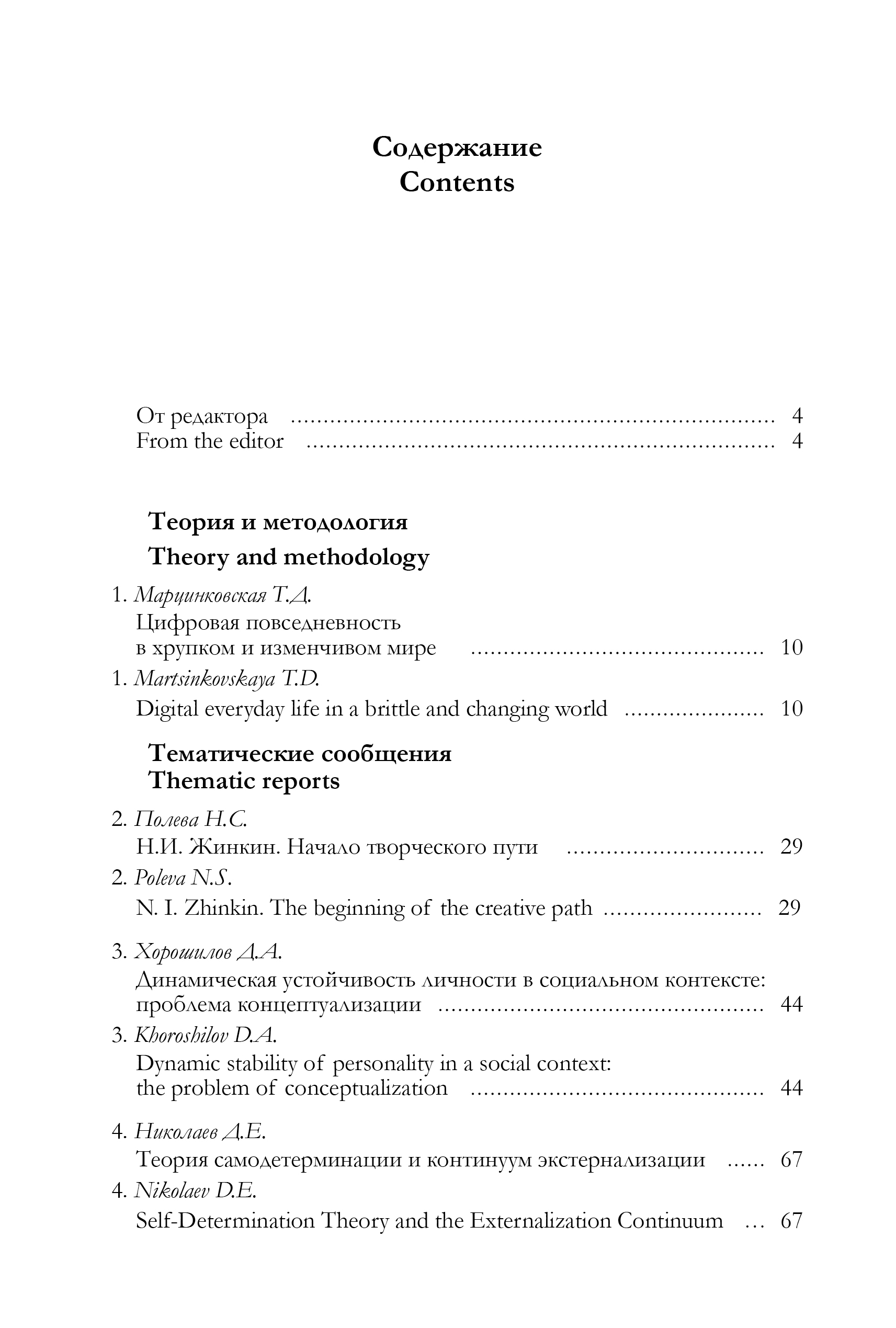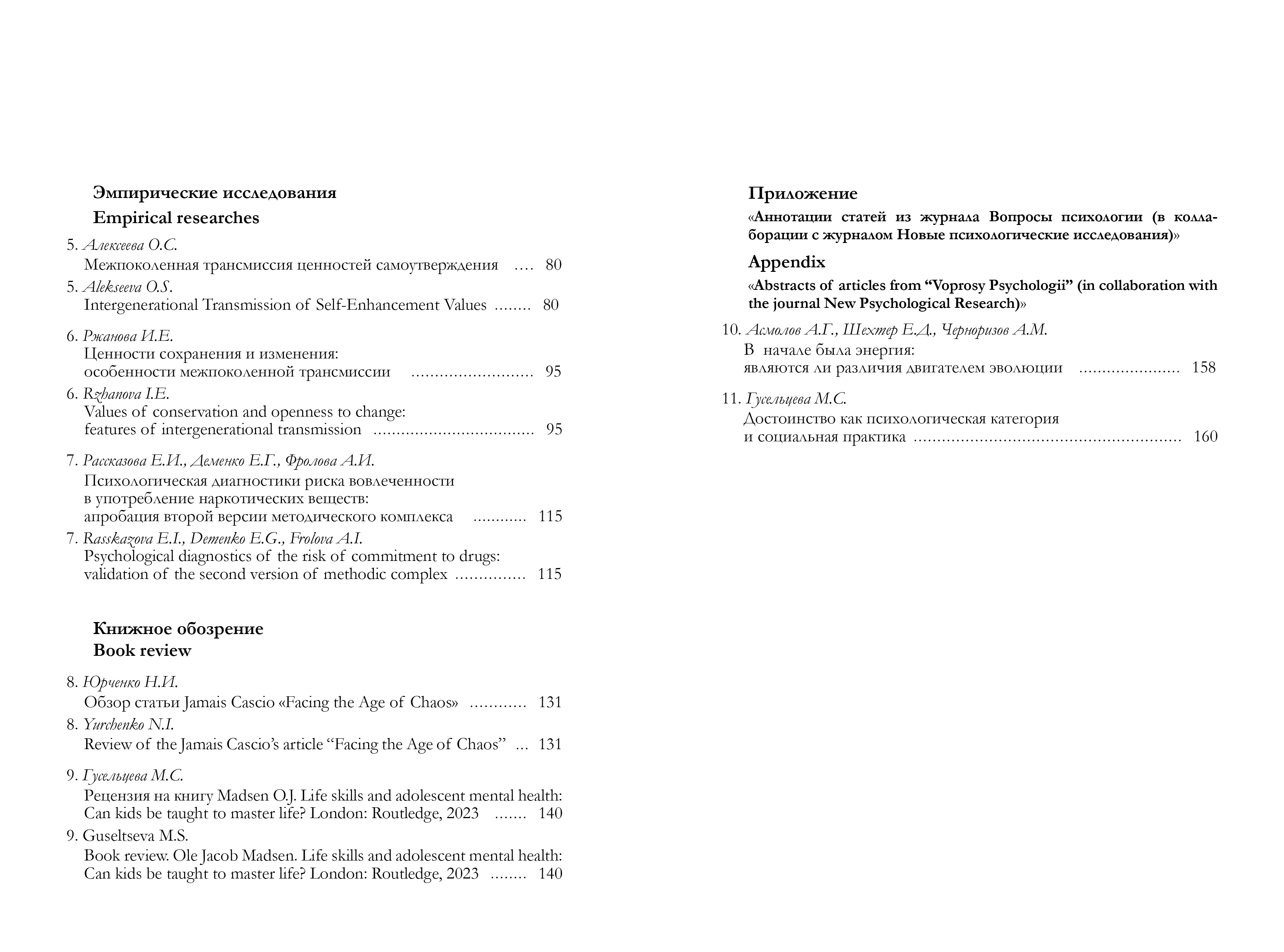From the Editor
Editor-in-chief of the journal «New psychological research» T. D. Martsinkovskaya, Moscow, 26 December 2023
Dear colleagues, I present the last, fourth issue of this year.
The issue opens with the article by T.D. Martsinkovskaya “Digital everyday life in a brittle and changeable world”, which examines the new area of digital everyday life for psychology. This problem is becoming increasingly in demand nowadays. The presented analysis of models of the modern world, as well as a review of the concepts of everyday life, clearly demonstrates both the relevance of these areas of psychological science and their connection.
Article by N.S. Poleva “N.I. Zhinkin. The beginning of a creative path" is dedicated to little-known facts of the creative biography of the remarkable psychologist N.I. Zhinkin. Activities of N.I. Zhinkin are closely associated with the Psychological Institute, but not much is known about his first achievements and scientific interests. At the same time, these works show not only the origins of the scientist’s later achievements, but also possible directions of scientific activity, which, unfortunately, were not realized.
In the article by D.A. Khoroshilov “Dynamic stability of personality in a social context: the problem of conceptualization” analyzes the determinants that define the boundaries of stability-variability of personality in the context of the evolution of conceptual ideas about the interaction of personality and social context. The author concludes that the system of scientific categories used in the article is heuristic both for studying the phenomenology of personality in a social context and for modeling the process of transforming knowledge embedded in society into individual structures of internal experience.
In the article by D.E. Nikolaev “The theory of self-determination and the continuum of externalization” shows the relevance of the problem of externalization for psychological science and proves the feasibility of introducing the concept of externalization into the theory of self-determination by R. Ryan and E. Deacy. Saying that human behavior regulated through externalization is more autonomous and does not involve the assignment of norms, values and patterns of behavior, the author at the same time emphasizes the difficulty of differentiating different types of regulation.
The article by O. S. Alekseeva “Intergenerational transmission of self-affirmation values” examines the transmission of these values, as well as the values of caring for people and nature between different generations. The author focuses on the values of self-affirmation and the values of self-transcendence. An analysis of the obtained materials allowed O.S. Alekseeva make the conclusion that differences in value orientations between parents and children of different generations are largely related to the sociocultural conditions in which these attitudes were formed.
Article by O.S. Alekseeva is closely related to the articles of I.E. Rzhanova “Values of preservation and change: features of intergenerational transmission.” Analysis of differences in value preferences showed that parents significantly more often choose conservation values, and children choose change values. Although not many significant connections were identified, it can be stated that father’s value preferences have a more pronounced impact on children’s values compared to maternal value preferences.
The article by E.I. Rasskazova E.G. Demenko and A.I. Frolova “Psychological diagnostics of the risk of involvement in drug use: testing of the second version of the methodological complex” presents one of the possible options for diagnosing the risk of involvement in drug use - diagnostics using the “empirical adjustment” type. From a large pool of questions are selected those that make it possible to distinguish between the clinical and control groups. This article describes a variant that includes items characterizing difficulties in regulating emotions and activities, as well as the desire for risk and the search for novelty.
N.I. Yurchenko provides a review of the article by Jamais Cascio “Facing the Age of Chaos”. An analysis of the components of the BANI concept is shown. According to the author of the article, the BANI structure is a tool for understanding chaos and recognition of the phase of transformation that the world is experiencing.
M.S. Guseltseva presented a review of the book Madsen O.J. “Life skills and adolescent mental health: Can children be taught to master life?” In this book the author discusses the rise of therapeutic culture and the psychologization of modern society.
This year was successful for our journal; we entered the Higher Attestation Commission of the Russian Federation and achieved a high rating and impact factor, which is especially pleasant for our young journal. I hope we will continue to develop productively together!

Happy New Year to everyone! I wish everyone optimism, new luck and success and, of course, prosperity and health in the New Year!!!


Received: 26th december 2023
Published: 26th december 2023